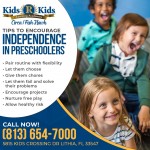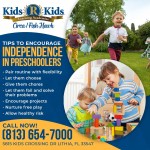Tips to encourage independence in preschoolers
Children are only too eager to grow up quickly and become independent. They seek independence from the moment they gain some motor skills. They try to feed themselves, dress up themselves, make their sandwich, tie their laces, and make their own choices! This need for independence is a great sign and must be given a structured environment to flourish in. Kids ‘R’ Kids, an educational preschool, suggests ways to foster independence in preschoolers so they can develop a sense of self, self-esteem, emotion regulation skills, and perseverance.
1. Pair routine with flexibility
A consistent routine enables children to anticipate their day and take on responsibilities accordingly. A predictable day gives a sense of safety to children and gives them a predictable sequence of activities to follow daily. The routine must not, however, be too rigid as it may lead to frustration. For instance, a routine where children know waking up is followed by brushing teeth, bathing, eating breakfast, going to school, coming back home, playing, eating dinner, and so on. There must be some room for flexibility in this routine to help children manage the day without getting overwhelmed.
As children get used to the routine, they learn to take on more responsibility for their activities with less help. Allowing them to take charge of their chores slowly in a safe environment gives them confidence and builds perseverance.
2. Let them choose
Choices are preceded by the cognitive function of decision-making. It gives children a sense of independence and allows them to explore their likes and dislikes. For instance, choosing what to wear or what to play helps develop their critical thinking skills. This doesn't mean they have free reign, it just means they have the freedom to choose from the safest options available. Praising them for their choices also helps build their self-esteem and empowers them to make more complex decisions going forward.
3. Give them chores
Research says that chores help children build a sense of responsibility and self-reliance, develop executive functions, teach teamwork and nurture empathy. Children love to imitate adults, especially when it comes to doing chores. Allowing children to help gives them a sense of control, helps them learn a new skill, calm tantrums or redirect behaviors, and builds their confidence. The task delegated may take a little longer or have a few extra steps, but it is worth the wait. For instance, asking them to help keep their folded clothes in the closet will make them feel responsible, or asking them to collect their toys and keep them neatly helps them become organized. Delegation of responsibility showcases to the children that they are trusted and competent.
4. Let them fail and solve their problems
Children must be allowed to make mistakes in their safe zone with adults. Giving them space and freedom to try to solve their small problems is a huge stepping stone towards independence and creative thinking. Children, in general, love to solve their problems. When they are learning to walk, they will fall. When they are trying to feed themselves they will spill. When they are trying to wear their shoes, they will wear them wrong. Let them make their mistakes so they can learn. Let them ask for help and give them hints so they can keep moving forward.
Letting children deal with tasks that are a little challenging yet within their capabilities is a great way to help them to deal with frustration, learn problem-solving, and stick through challenging situations. Acknowledging their efforts is more important than the success itself.
5. Encourage projects
Completing projects such as coloring, puzzles, and crafts gives a sense of accomplishment and self-esteem. These activities require extended focus and patience and deserve praise. Praising them to stick through activity helps them to build persistence and grit. Encouraging them to complete these tasks communicates to them that they are capable. This translates into confidence and motivation.
6. Nurture free play
Structured and unstructured play, both are very important for fostering creativity, problem-solving, and autonomy. Preschoolers can use a variety of art materials (crayons, markers, or chalk), building materials (blocks, MagnaTiles, or Legos), or imaginary play props and then construct their craft or play. Repurposed materials and recyclables, such as paper towel rolls can be turned into a telescope, a tube, a car, a plane, a magic wand.
Observing their unstructured play can give insight into their interests. These insights can help parents and teachers create further activities that resonate with the children’s interests. Ideally, children should be left to their own devices during these free play sessions but they can be given some guidance if they seem stuck.
Praising them and encouraging them as they play helps to build their confidence in their capabilities.
7. Allow healthy risk
A healthy risk includes riding bikes or climbing a tree under a parent’s watchful eye. Healthy risk is different from a hazard, which is unpredictable and unmanageable such as traffic. It is important to allow children to take healthy risks that support their growth and development. When taking healthy risks, adults must ensure the children’s safety and children must also be aware of how to manage the potential danger.
Education must aim to build children’s self-esteem and self-reliance at an early age. At Kids ‘R’ Kids, preschool teachers aim to build independent learners in a safe and organized environment.
Why Kids ‘R’ kids?
The philosophy of “Hug First, Then Teach”, defines every aspect of what Kids ‘R’ Kids, Circa Fishhawk stands for. Unlike many daycare centers or childcare providers, its methodology is a whole-child approach. It constantly strives to strengthen and encourage every child’s emotional, intellectual, social, and physical well-being through the expertise of its childcare providers and a unique partnership with parents.
Kids ‘R’ Kids International is accredited by AdvancED®, the world’s largest education community, and the Southern Association of Colleges and Schools Council on Accreditation and School Improvement (SACS/CASI). SACS/CASI is an accreditation division of AdvancED®. This accreditation ensures that the high accreditation standards are met and exceeded.
Call today at (813) 654-7000 to learn more about the Kids ‘R’ Kids before and after school programs (Kindergarten to Grade 5) or to schedule a visit.


























